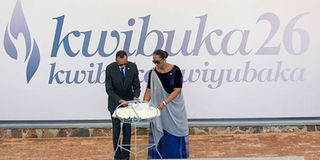Rwanda fights the genocide denial

Rwandan President Paul Kagame (left) and First Lady Jeanette Kagame lay a wreath at the Kigali Genocide Memorial Centre on April 7, 2020. PHOTO | URUGWIRO
What you need to know:
- CNLG says they ensure that genocide studies are part of the school syllabus from primary education all the way to university.
- In January, more 1,600 history secondary school teachers were enrolled in a civic education programme by the Rwanda Education Board for training on the genocide.
Rwandans, led by President Paul Kagame, last week marked the 26th annual commemoration of the 1994 Genocide against the Tutsi.
The president urged citizens, who stayed home due to the coronavirus lockdown, to pay tribute to the lives that were lost.
Commemoration activities, including the laying of wreaths, were organised by the National Commission for the Fight against Genocide (CNLG), which educates the youth about genocide ideology and revisionism.
“There is nothing you can do with the older generation; they believe what they believe and were around when the genocide against the Tutsi happened. But genocide deniers have been able to exploit the Internet and social media to pass on misleading theories to the youth,” executive secretary of CNLG Jean Damascene Bizimana told The EastAfrican.
“We have been able to fight against some of the websites that spread false theories, but the youth are still able to access them through social media platforms like YouTube, which are difficult to control.”
On Thursday, President Kagame fired state minister for East African Community Olivier Nduhungirehe for "consistently acting based on personal opinions".
The sacking was announced by Prime Minister Edouard Ngirente on Thursday night.
"The President of The Republic has removed from office ambassador Olivier Nduhungirehe for consistently acting based on personal opinions over government policies, while serving as Minister of State in the Ministry of Foreign Affairs and International Co-operation in Charge of East African Community," the statement from the Prime Minister says.
It was not immediately clear exactly what triggered Mr Nduhungirehe’s sacking, but he is a heavy social media user—especially on Twitter—engaging individuals on multiple subjects, sometimes in a heated manner deemed controversial and contrarian to officialdom.
The government and its agencies continue to fight genocide ideology among the youth, who make up to 70 per cent of the population, through education.
CNLG says they ensure that genocide studies are part of the school syllabus from primary education all the way to university.
In January, more 1,600 history secondary school teachers were enrolled in a civic education programme by the Rwanda Education Board for training on the genocide.


